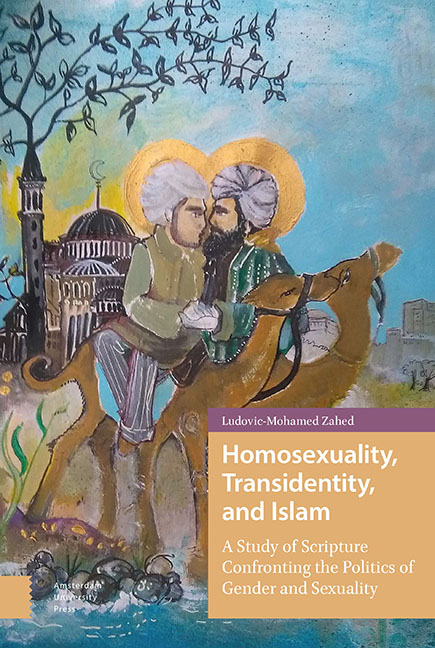 Homosexuality, Transidentity, and Islam
Homosexuality, Transidentity, and Islam Book contents
- Frontmatter
- Contents
- List of Figures
- Acknowledgments
- Foreword
- Introduction
- I The Qur’anic Ethics of “Nature”: Gender, Sexuality, and Diversity
- II Distressing Qur’anic Verses?
- III The Prophet: A Living Incarnation of Qur’anic Ethics
- IV Islamic Apocrypha Advocating the Stoning of “Sodomites”
- V Postcolonial Orientalisms
- VI “Abnormals”: From Cultural Diversity to Dogmatic Uniformity
- VII Towards a Structural Reevaluation of Cultural Values
- VIII Pan-Arabist Literary and Identity Censorship
- IX Orientalist Shi’ism and Literary Homoeroticism
- X Homonationalism and Performative Sexual Categorization
- XI A “Crisis” of Categories, Geopolitics or Civilization
- Conclusion
- Afterword
- Bibliography
- Index
Foreword
Published online by Cambridge University Press: 20 November 2020
- Frontmatter
- Contents
- List of Figures
- Acknowledgments
- Foreword
- Introduction
- I The Qur’anic Ethics of “Nature”: Gender, Sexuality, and Diversity
- II Distressing Qur’anic Verses?
- III The Prophet: A Living Incarnation of Qur’anic Ethics
- IV Islamic Apocrypha Advocating the Stoning of “Sodomites”
- V Postcolonial Orientalisms
- VI “Abnormals”: From Cultural Diversity to Dogmatic Uniformity
- VII Towards a Structural Reevaluation of Cultural Values
- VIII Pan-Arabist Literary and Identity Censorship
- IX Orientalist Shi’ism and Literary Homoeroticism
- X Homonationalism and Performative Sexual Categorization
- XI A “Crisis” of Categories, Geopolitics or Civilization
- Conclusion
- Afterword
- Bibliography
- Index
Summary
If there is a God, he cannot be but good and wanting good, especially if it is he who created humanity.And if there are prophets who claim to have heardthe voice of God and want to pass on his message,then they too cannot but strive after the best forall people. The diversity among people is enormousand the Qur’an expresses that perfectly in Suraar-Rum (30:22): “And of His signs is the creation ofthe heavens and the earth and the diversity of yourlanguages and your colours. Indeed in that are signsfor those of knowledge.”
Thomas Hobbes (1588-1679) has a different view ofhumanity, which he expresses by citing the Romanproverb Homo homini lupusest: “A man is a wolf to another man.”Man is also someone who watches for opportunities tostrike, to attack, and possibly to even killanother. The wolf does that by attacking the weak inthe pack. In doing so, man tries to force the weakin society to conform to the rules of the dominantgroup and if the weaker ones do not obey, punishmentfollows in no small measure.
Homosexuals, lesbians, and transpeople have alwaysexisted in every community and in every society, inevery part of the world. Often, they had to concealtheir identity and adapt to the prevailing norms oftheir communities. Rarely could they really be whothey were. This applies to all times and to allcommunities.
A true God and a true prophet, by their nature, loveall people. They cannot be but like that, otherwisethey would not be God and prophet. And that appliesto the God of Islam and the Prophet of Islam. Thehistory of Islam, however, is a sad one, foralthough it has known enlightened times,authoritarian patriarchal traditions were almostalways dominant, and minorities, such as sexualones, had to submit more often than not to the moodsand caprices of their rulers.
- Type
- Chapter
- Information
- Homosexuality, Transidentity, and IslamA Study of Scripture Confronting the Politics of Gender and Sexuality, pp. 9 - 10Publisher: Amsterdam University PressPrint publication year: 2019
